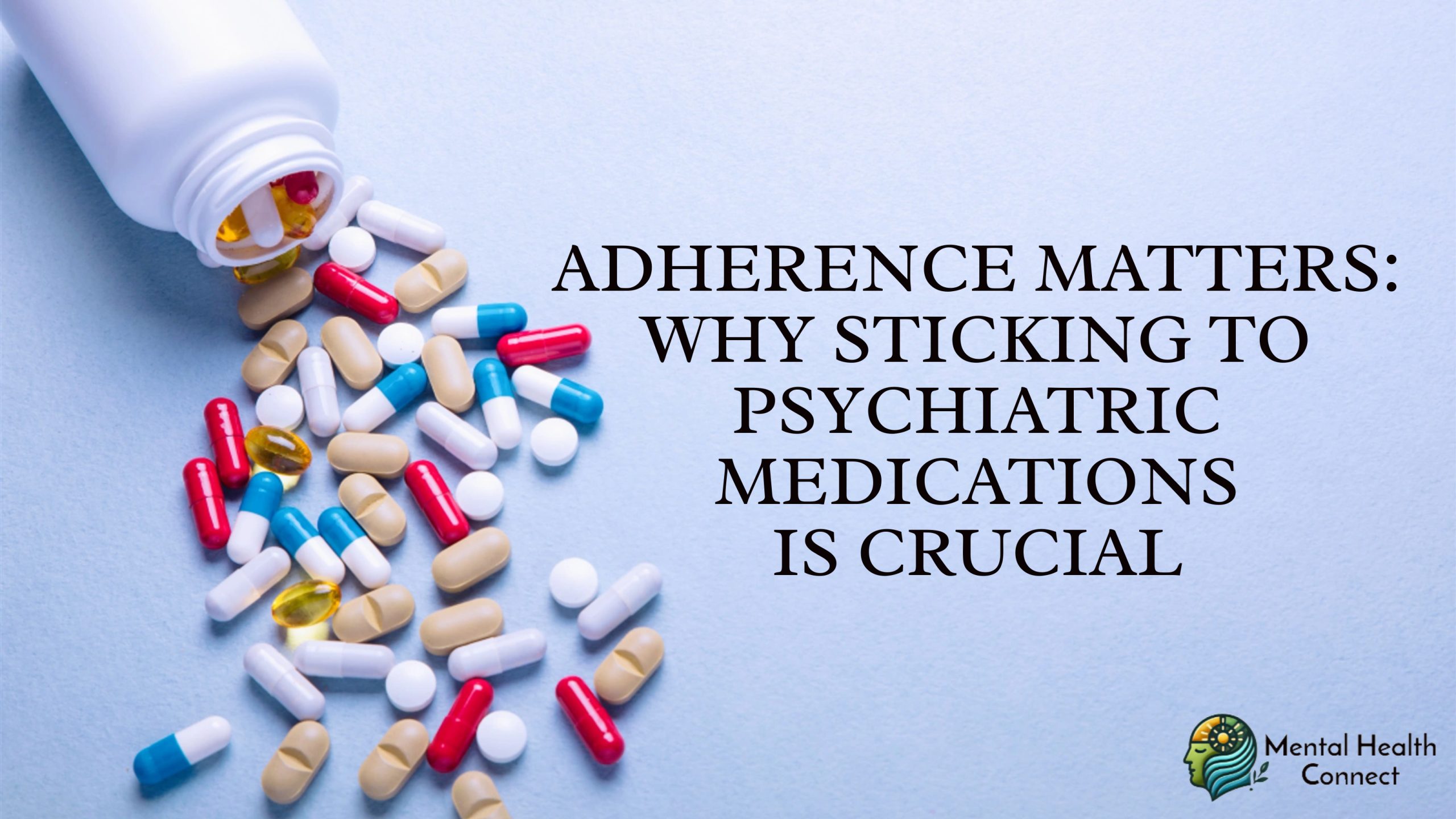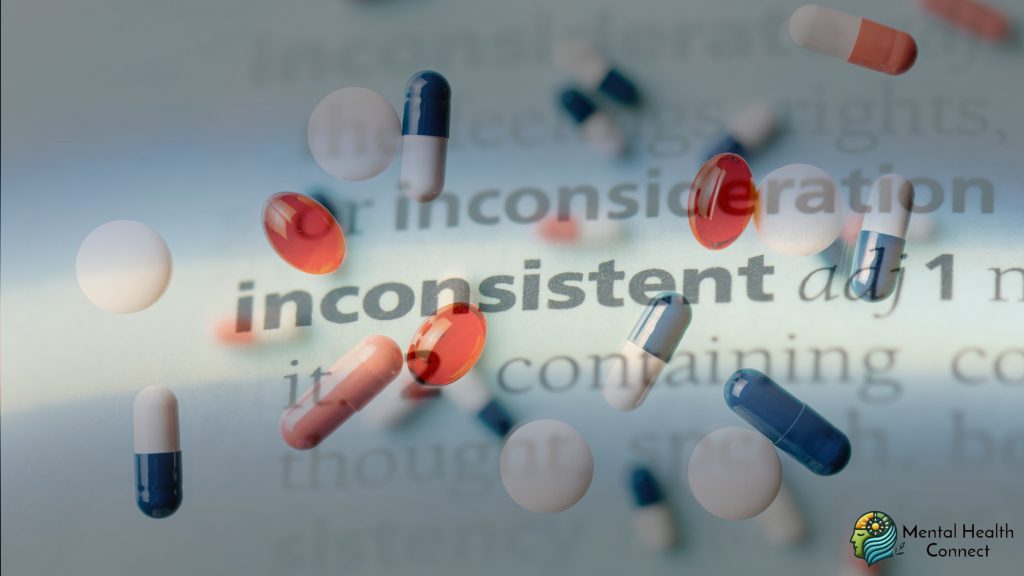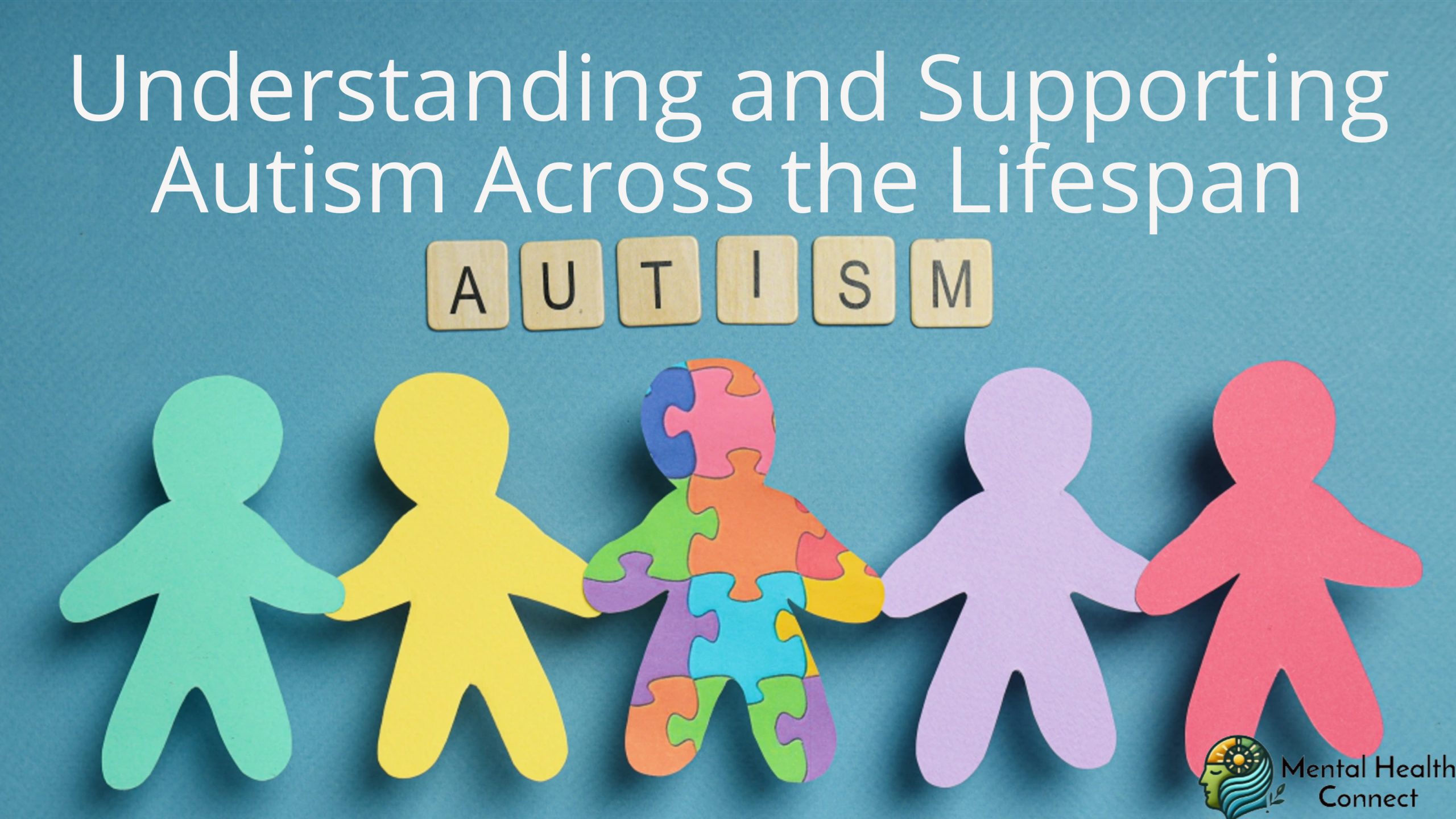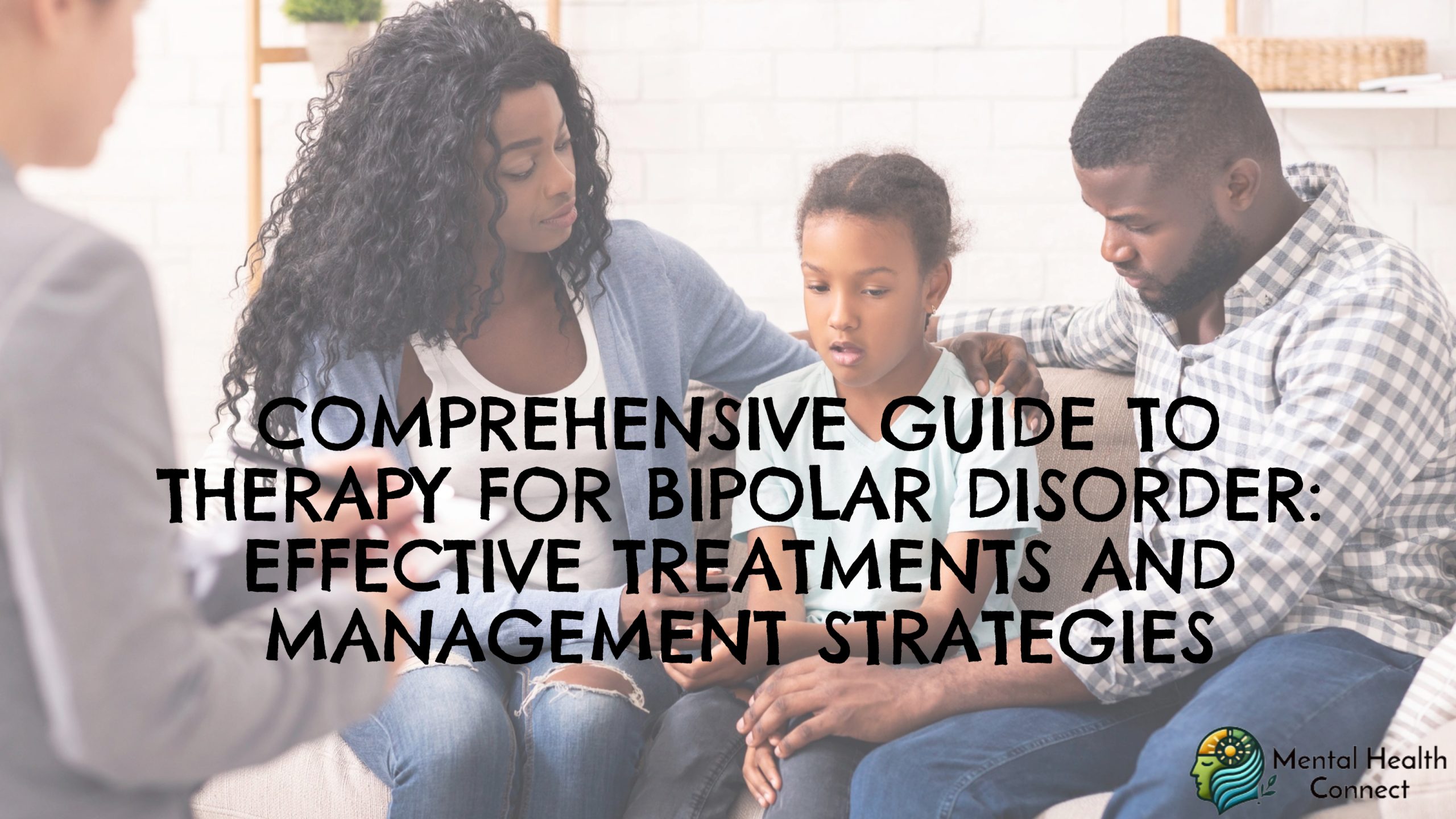Adherence Matters: Why Sticking to Psychiatric Medications Is Crucial

For many people with mental health conditions, prescribed medication forms a cornerstone of effective treatment. Yet studies consistently show that approximately 50% of patients don’t take psychiatric medications as prescribed. This widespread challenge of medication non-adherence significantly impacts treatment outcomes, quality of life, and healthcare costs. Understanding why adherence matters and developing practical strategies to maintain consistent medication use can dramatically improve mental health treatment success.
The Hidden Challenge of Non-Adherence

Medication non-adherence takes many forms:
- Complete discontinuation without medical guidance
- Skipping doses regularly or irregularly
- Taking medication at inconsistent times
- Adjusting dosages without consultation
- “Drug holidays” where medication is temporarily stopped
- Selective adherence to some medications but not others
Each of these patterns can significantly undermine treatment effectiveness, often in ways that aren’t immediately obvious to the individual.
Why Adherence Matters: The Consequences of Inconsistent Use

Clinical Consequences
Non-adherence directly impacts symptom management and recovery:
- Symptom Recurrence or Rebound: When medications are stopped abruptly, symptoms often return, sometimes more intensely than before treatment
- Delayed Treatment Response: Inconsistent medication levels can prevent reaching therapeutic thresholds needed for symptom relief
- Increased Risk of Relapse: Studies show significantly higher relapse rates among those who discontinue or take medications inconsistently
- Hospitalization Risk: Non-adherence is associated with up to a five-fold increase in psychiatric hospitalization rates
- Treatment Resistance: Repeated cycles of starting and stopping medications can lead to poorer response over time
Quality of Life Impact
Beyond clinical outcomes, non-adherence affects daily functioning:
- Disrupted Daily Functioning: Work, school, and relationships suffer during symptom recurrence
- Employment Challenges: Medication inconsistency can lead to increased absenteeism and reduced productivity
- Relationship Strain: Returning symptoms may impact communication and emotional regulation
- Educational Setbacks: Students may experience academic difficulties when symptoms interfere with concentration and attendance
- Financial Consequences: Additional treatments and potential hospitalizations incur significant costs
Biological Considerations
Inconsistent medication use affects brain chemistry:
- Neurochemical Fluctuations: Many psychiatric medications require stable blood levels to effectively regulate neurotransmitters
- Withdrawal Effects: Abrupt discontinuation can trigger physical and psychological withdrawal symptoms
- Receptor Sensitivity Changes: Starting and stopping medications can alter receptor sensitivity in ways that affect future treatment response
- Stress System Activation: Symptom recurrence often activates stress responses that can further exacerbate mental health conditions
Understanding Barriers to Adherence
Addressing medication adherence requires understanding its complex causes:
Medication-Related Factors
- Side Effects: Unwanted effects like weight gain, sexual dysfunction, or sedation
- Delayed Benefit: Many psychiatric medications take weeks to show full effectiveness
- Complex Regimens: Multiple medications or complicated dosing schedules
- Medication Costs: Financial barriers to obtaining prescriptions
Psychological Factors
- Stigma: Shame or embarrassment about needing psychiatric medication
- Denial: Difficulty accepting the need for ongoing treatment
- Ambivalence: Mixed feelings about medication dependency
- Memory Problems: Forgetting doses due to cognitive symptoms
- Symptom Interference: Conditions like depression may reduce motivation for self-care
Social and Environmental Factors
- Lack of Support: Limited encouragement from family or friends
- Practical Barriers: Transportation issues or difficulty obtaining refills
- Cultural Factors: Community attitudes toward psychiatric treatment
- Provider Relationship: Poor communication with healthcare providers
- Limited Education: Insufficient understanding about medication purpose and importance
Strategies to Improve Adherence

Enhancing Knowledge and Understanding
Education forms the foundation of improved adherence:
- Medication Education: Learn specific details about how your medication works and when to expect benefits
- Written Information: Request printed materials explaining your treatment
- Consequence Awareness: Understand the specific risks of non-adherence for your condition
- Family Education: Include trusted supporters in educational discussions when appropriate
- Realistic Expectations: Develop clear understanding of potential side effects and management strategies
Practical Adherence Tools
Simple systems can dramatically improve consistency:
- Medication Organizers: Weekly pill containers separate doses by day and time
- Electronic Reminders: Phone alarms, apps, or automated text messages
- Routine Integration: Link medication times with established daily activities
- Visual Cues: Keep medications visible in frequently used locations
- Digital Tools: Medication tracking apps with adherence reports
- Simplified Regimens: When possible, consolidate medications or use extended-release formulations
Enhancing Provider Communication
Better clinical relationships improve adherence:
- Open Dialogue: Discuss adherence challenges honestly with providers
- Side Effect Reporting: Promptly share concerning side effects rather than discontinuing
- Shared Decision-Making: Actively participate in medication selection and adjustments
- Regular Follow-up: Maintain consistent appointments even when feeling well
- Access Planning: Establish clear procedures for urgent concerns between visits
- Provider Selection: When possible, work with clinicians who communicate effectively
Managing Side Effects Proactively
Side effect strategies reduce adherence barriers:
- Anticipatory Management: Learn about potential side effects before they occur
- Timing Adjustments: Some side effects improve with changes in when medication is taken
- Gradual Titration: Slower dose increases may reduce initial side effects
- Adjunctive Treatments: Additional medications sometimes help manage side effects
- Lifestyle Modifications: Diet, exercise, or sleep changes can minimize certain side effects
- Pharmacist Consultation: Pharmacists often offer practical side effect management advice
Building Social Support
Support networks reinforce adherence:
- Designated Supporters: Identify specific people who can provide reminders
- Peer Support: Connect with others managing similar conditions
- Support Groups: Participate in groups focusing on your specific condition
- Family Involvement: When appropriate, include family in treatment discussions
- Recovery Community: Engage with broader mental health recovery networks
Addressing Psychological Barriers
Internal resistance requires specific approaches:
- Values Clarification: Connect medication adherence to your personal priorities
- Cognitive Reframing: Challenge negative thoughts about medication
- Motivational Enhancement: Identify personal reasons for treatment beyond symptom control
- Self-Monitoring: Track the relationship between adherence and functioning
- Develop Adherence Identity: Begin seeing medication consistency as part of self-care
Special Considerations for Specific Populations
Youth and Young Adults
Young people face unique adherence challenges:
- Identity Concerns: Medication may conflict with developing self-image
- Peer Influence: Social factors strongly impact treatment attitudes
- Transition Planning: Moving from pediatric to adult care creates vulnerability
- Parent-Child Dynamics: Finding balance between support and independence
- Academic Integration: Managing medications within school environments
Older Adults
Seniors require specific adherence approaches:
- Polypharmacy: Managing multiple medications increases complexity
- Cognitive Changes: Memory issues may affect medication routines
- Sensory Limitations: Vision or hearing changes can impact instruction understanding
- Fixed Incomes: Financial constraints may affect prescription filling
- Caregiver Coordination: Ensuring clear responsibility for medication management
When Adherence Becomes Difficult

Warning Signs of Adherence Problems
Recognize early indicators of developing adherence issues:
- Increasing reluctance to take medications
- Growing focus on minor side effects
- Missing appointments or requesting fewer follow-ups
- Making statements about not needing medication anymore
- Increased secrecy or changing the subject when medication is discussed
Creating a Personal Adherence Plan
Develop a written strategy addressing your specific challenges:
- Identify your personal adherence barriers
- List specific strategies for each barrier
- Include emergency contacts for adherence support
- Document early warning signs of symptom return
- Create a step-by-step process for handling missed doses
Medication adherence represents one of the most powerful yet underappreciated factors affecting mental health treatment success. By understanding the crucial importance of consistent medication use and implementing personalized strategies to overcome adherence barriers, individuals can significantly improve their treatment outcomes and quality of life. While perfect adherence may not always be achievable, even modest improvements in medication consistency often yield substantial benefits in symptom control, functioning, and overall wellbeing.
FAQ About Psychiatric Medication Adherence
What should I do if I accidentally miss a dose?
Generally, take it when you remember unless it’s almost time for your next dose. Never double-up on doses without specific guidance from your provider. Each medication has different recommendations for missed doses, so ask your provider for specific instructions for your prescriptions.
Is it okay to adjust my medication dose based on how I’m feeling?
Self-adjusting dosages without medical guidance can lead to inadequate treatment, increased side effects, or withdrawal symptoms. If you feel your current dose isn’t optimal, discuss this with your provider who can help make safe adjustments.
How do I manage medications when traveling across time zones?
For short trips, maintaining your home schedule often works best. For longer journeys, gradual adjustment of medication times (1-2 hours per day) helps minimize disruption. Always keep medications in carry-on luggage and bring documentation of prescriptions when traveling.
What if I can’t afford my medications?
Many options exist including prescription assistance programs, manufacturer discount cards, generic alternatives, pharmacy discount programs, and community health centers. Your healthcare provider, pharmacist, or a social worker can help navigate these resources.
How do I know if my concerns about long-term medication use are valid or if they’re stemming from stigma?
Valid medication concerns typically involve specific side effects, interactions with other treatments, or documented long-term risks. Concerns primarily focused on concepts like “dependency”, “unnaturalness”, or comparing yourself negatively to others may reflect internalized stigma worth exploring further.



Leave a Reply